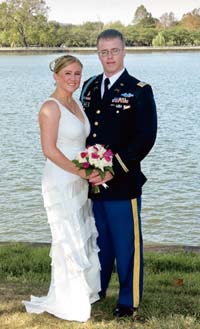 |
 |
| current issue |  | past issues |  | send a letter/news |  | address update |  | advertise |  | about us |  | alumni home |
Features
After War, LifePage 3 of 5
I took point and I had Nathan [the radio operator] take the rear because I didn't know where we were going. Ordinarily you'd have someone junior take the front. But I'm not going to put someone in a position like that. I'll assume that risk myself.
We were moving through fields. Difficult walking, really muddy. Just tired. Another squad had moved through this section right before us. We took a break as the sun was coming up. We were nearly into position.
There was a small foot trail. When I went around a corner, there was an embankment, and I guess something was buried in it. It was probably meant for a vehicle. Somehow I triggered it. So I got blown up. Everyone rushed over, started rendering aid. There happened to be a physician's assistant who almost hadn't come on the mission. He happened to be friends with Dora. He was probably the best qualified person to be there at that moment to help me. They weren't going to land an aircraft because it was uncertain terrain.
Back at the base, Rodriguez heard Quilty's battle roster number come over the radio. "It was like a knife cutting right through me," he says. Rodriguez knew that Quilty had planned to make the Army his career, and he was expecting him to rocket quickly through the ranks. What, he wondered, would happen to those plans now?
Safe at home six years later, Quilty stops drawing. He looks out the window. In a separate conversation, Dora fills in a few blanks: Her friend the P.A. talked the pilot into landing. By the time Scott arrived at the hospital, all but five minutes of the "golden hour," the best opportunity to save him, had passed.
For Scott, "Memory starts five days later. I woke up in an aircraft, naked and on drugs."
Here are the reasons Scott Quilty considers himself lucky. He lost his right arm, but he's left-handed. He suffered no head injuries and no PTSD. Since the surgeries ended and the wounds healed and he got accustomed to the prosthetics, he's had no pain. His family was with him in the hospital. "And my biggest advantage," he says, "was Dora."
 Courtesy Photo DRESS UNIFORM: Married while Scott was in the hospital, the Quiltys celebrated later with family and friends. |
When Scott's Medevac arrived in Washington, Dora knew exactly what he was flying into. She'd spent a year and half as an occupational therapist at Walter Reed. She knew how to navigate the system, and she reassured his family: In a few months he'll be walking; in a year, he'll be able to run. "I could give them this image of somebody who's going to get better, not somebody who's broken," she says. That's the way she saw him, right from the moment she heard the news.
Scott's second day at Walter Reed, he asked his parents to leave the room. The Quiltys still enjoy reciting the dialogue that followed, laughing at how simultaneously romantic and unromantic it was.
"We talked about this before I left," Scott said ("high as a kite on drugs," Dora adds now). "Do you remember?"
"Of course. I told you that no matter what happened, I could handle it."
"Do you still think that?" he asked. "Yes," she replied.
"Well, then, we should probably get married sooner rather than later."
They were married in the hospital on Veterans Day 2006—surprising family members who thought they were assembling for brunch. Though her parents had given their permission (something Scott still marvels at), no one had expected the wedding to come just five weeks after the explosion. In a year they'd have the big party with the white dress. For now, some food in the hospital's O.T. room would do as a reception.
The next year brought big physical challenges and bigger mental ones. Six weeks after his arrival at Walter Reed, Scott and his mother moved into a nearby outpatient house as he continued daily therapy. Dora had to return to Fort Benning, where she was stationed. When she managed to transfer in February 2007, she and Scott rented an apartment in Maryland. He was still in a wheelchair. After their first dinner at home, she said, "I cooked; you clean." When he looked surprised, she said, "You can't put dishes in your lap and bring them to the sink? I think you can."
Page: < Previous 1 2 3 4 5 Next >
Easy to print version

